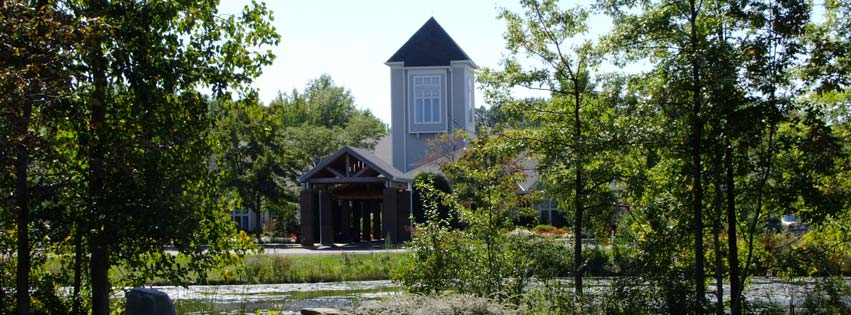February 14, 2024 —Kendal-affiliated communities are bustling with signs of spring. From resident-maintained gardens to tree-lined walking paths, residents and staff alike can find solace in nature on Kendal campuses. These lush spaces provide more benefits than visual beauty and feelings of serenity. The cultivated environments are purposefully grown to help Kendal achieve goals related to sustainability.
At Kendal, residents and staff take the lead on purposeful engagement with the environment around them, from suburban neighborhoods to urban high rises. Being a good steward of the environment and making an actionable change to reduce our carbon footprint is a priority for communities across the Kendal System.
Building Habitats for Wildlife on Campus Grounds
To earn a designation as a Certified Wildlife Habitat by the National Wildlife Federation, a community’s garden must provide natural sources of food, water, cover and places to raise young and be maintained in a sustainable way that incorporates native plants, conserves water and doesn’t rely on pesticides.
Kendal on Hudson sits on a 25-acre campus near the banks of the Hudson River in New York and is surrounded by the serene forest of Rockwood Hall State Park Preserve. Kendal-Crosslands Communities features forests, meadows and an abundance of essential elements needed by wildlife in the Pennsylvania countryside. Both communities earned their Certified Wildlife Habitat site status with campuses featuring scenic trails where residents and staff can be up close and personal with nature.
In downtown Chicago, The Admiral at the Lake also works proactively to support local wildlife. While a 31-floor high-rise may not be the first place folks think of when they imagine a sustainable garden, The Admiral’s resident-led Garden Committee has successfully created a certified, natural space in the community’s first-floor garden. The garden is certified by the National Wildlife Federation and is home to local wildlife and native plants. Whether on the property itself or on trails along Lake Michigan, residents and staff alike can enjoy nature right in the heart of the city.

Cultivating Tree-lined Communities
Arboretums are botanical gardens specializing in trees or woody plants that provide educational opportunities and peaceful aesthetics while supporting environmental conservation. The ArbNet Arboretum Accreditation Program is the only global initiative to officially recognize arboreta at various levels of development, capacity and professionalism. On the 125-acre campus of Collington, its Level One Accredited arboretum – which is recognized as an accredited arboretum in the Morton Register of Arboreta – is a source of both pride and enjoyment for Collington and the larger community.
Kendal at Oberlin’s John Bartram Arboretum, with over 100 acres of wetlands and wooded areas, was recently upgraded to a Level Two status through the ArbNet Arboretum Accreditation Program, joining just 170 other arboretums worldwide. The designation requires arboretums to meet multiple criteria, including having more than 100 labeled trees and woody plants, public access and enhanced public and educational programs. More recently, the Arbor Day Foundation named Kendal at Oberlin a 2022 Tree Campus® Healthcare institution for its commitment to planting, nurturing and celebrating trees. Passionate residents continue to prioritize their natural environment alongside staff for the enjoyment of all and the preservation of the land.
Across the Kendal System, growing and maintaining an environment welcoming to residents, staff and wildlife remains central to our shared goal of being good stewards of the earth’s natural resources.
